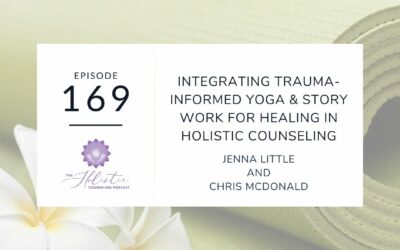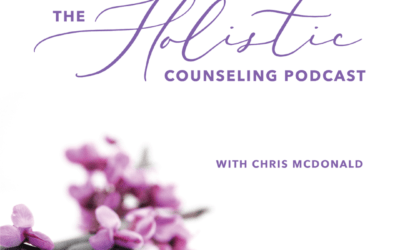Navigating Spiritual Awakening: A Holistic Approach
Introduction Are you a mental health therapist striving to deepen your knowledge of holistic practices and build your practice with confidence? Today, we delve into the journey of spiritual liberation, exploring how one clinician broke free from the constraints of a...
Self-Care Practices You May Not Have Heard Of
Are you ready to deepen your self-care journey? On this episode of the Holistic Counseling Podcast, Chris McDonald explores unique self-care practices that go beyond the usual advice. Discover innovative ways to nurture your mind, body, and spirit that you might not...
Why Complementary and Alternative Practices Deserve a Spotlight in Mental Health Care
Welcome to this episode of the Holistic Counseling Podcast! I'm your host, Chris McDonald, licensed therapist, and today, I am super stoked for an enlightening conversation that perfectly aligns with our mission. We’re diving deep into the waters of complementary and...
Embracing Mindful Movement in Holistic Counseling
The Transformative Power of Mindful Movement in Therapy Are you eager to enrich your therapeutic practice with holistic methods that harmonize mind, body, and spirit? Mindful movement, a profound approach to wellness, extends beyond traditional therapy by intertwining...
Navigating Chronic Illness with a Holistic Counseling Approach
Do you encounter clients grappling with chronic illness, or perhaps you’re navigating these challenges yourself? Chronic illness affects an individual’s entire being—body, mind, and spirit. It’s only logical that our therapeutic approaches should be holistic, treating...
Exploring New Ways to Take Care of Yourself
Today, I want to chat about something really cool and a bit different. You know how we always hear about taking care of ourselves with things like bubble baths or watching a movie? Well, I've been diving into some unique ways to look after our minds and bodies that...
Integrating Trauma-Informed Yoga and Story Work into Holistic Healing: A Transformative Approach
Welcome to a journey of profound healing and self-discovery. Today, we delve into the transformative synergy of trauma-informed yoga and story work, a holistic approach that promises to unlock new pathways to healing. As we explore this topic, I invite you to open...
Unveiling the Transformative Power of Somatic Practices in Holistic Therapy
This blog is repurposed from the podcast episode Unveiling the Transformative Power of Somatic Practices in Holistic Therapy , Interview with Maira Holzmann In a world filled with constant chatter and distractions, have you ever wondered how to truly connect with...
Discover How To Help Clients Heal Through Parts Work, Inner Child Work & The Adult Chair Model
The blog and podcast interview with Jenny Jansen explore the Adult Chair Model, a practical tool for helping clients heal from past wounds and limiting beliefs. The model divides one’s lifespan into three chairs: the child chair (ages 0-6), the adolescent chair (around age 7 to 24-25), and the adult chair (biologically around age 25-30). Many people get stuck in the adolescent chair, which is driven by the need to fit in and be acceptable. This can lead to the development of masks, unhealthy coping mechanisms, and a lack of self-awareness.
Working with the inner child is crucial in this model, as it helps individuals reconnect with their core needs and emotions. The inner child often carries feelings of abandonment, self-doubt, and unmet needs. Healing involves forming a relationship with the inner child, acknowledging their feelings, and learning to nurture and validate them. Understanding the roles of different parts of ourselves, including defenses and exiles, is essential in this process. Integrating inner child work into therapy helps clients uncover and address issues rooted in childhood experiences, ultimately leading to more authentic and fulfilling lives.
Jenny Jansen emphasizes that clients don’t have to do this work alone. Therapists can guide them in developing a nurturing relationship with their inner child, facilitating the integration of their core needs and emotions. This transformative process encourages living from the healthiest version of oneself, improving relationships and overall well-being. The blog and interview provide insights into the Adult Chair Model and the value of inner child work in helping clients heal and grow.
Deconstruction and Reconstruction of Faith: Where Trauma and Spirituality Intersect
A summary of a discussion on the topic of the “Deconstruction and Reconstruction of Faith: Where Trauma and Spirituality Intersect.” It explores the intricate interplay between faith, spirituality, and the impact of trauma. The discussion emphasizes the process of faith deconstruction and reconstruction, particularly in the context of trauma, and the role of mental health therapists in guiding individuals through this journey.
Deconstruction of faith is described as the process of questioning and reevaluating one’s religious or spiritual beliefs, often triggered by life events or questions. It involves doubting, questioning, and sometimes even distancing oneself from faith. The text highlights that deconstruction is a messy and complex process of breaking down one’s faith to determine if it truly aligns with one’s beliefs and values.
Trauma is mentioned as a significant factor that can lead to questioning one’s faith, as individuals may struggle to reconcile the existence of a benevolent God with the suffering they’ve experienced. Mental health therapists are encouraged to create a safe space for clients to explore their spirituality and interact with their beliefs, allowing them to emotionally connect with their faith and find healing and solace.












